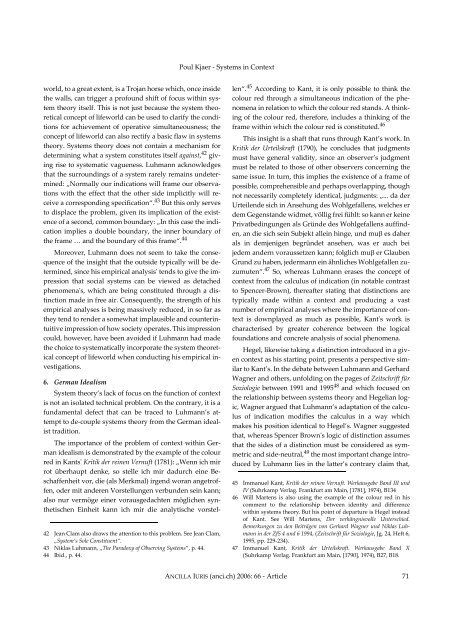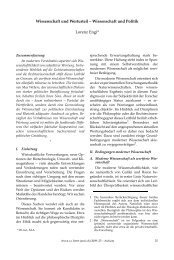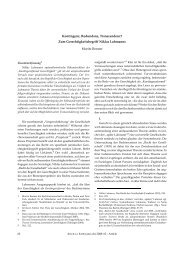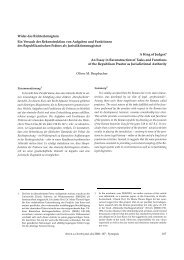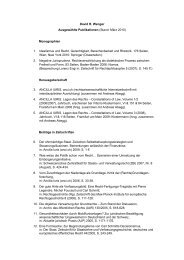On the outcome of the Habermas/Luhmann-debate
On the outcome of the Habermas/Luhmann-debate
On the outcome of the Habermas/Luhmann-debate
Create successful ePaper yourself
Turn your PDF publications into a flip-book with our unique Google optimized e-Paper software.
world, to a great extent, is a Trojan horse which, once inside<br />
<strong>the</strong> walls, can trigger a pr<strong>of</strong>ound shift <strong>of</strong> focus within sys‐<br />
tem <strong>the</strong>ory itself. This is not just because <strong>the</strong> system <strong>the</strong>o‐<br />
retical concept <strong>of</strong> lifeworld can be used to clarify <strong>the</strong> condi‐<br />
tions for achievement <strong>of</strong> operative simultaneousness; <strong>the</strong><br />
concept <strong>of</strong> lifeworld can also rectify a basic flaw in systems<br />
<strong>the</strong>ory. Systems <strong>the</strong>ory does not contain a mechanism for<br />
determining what a system constitutes itself against, 42 giv‐<br />
ing rise to systematic vagueness. <strong>Luhmann</strong> acknowledges<br />
that <strong>the</strong> surroundings <strong>of</strong> a system rarely remains undeter‐<br />
mined: „Normally our indications will frame our observa‐<br />
tions with <strong>the</strong> effect that <strong>the</strong> o<strong>the</strong>r side implicitly will re‐<br />
ceive a corresponding specification“. 43 But this only serves<br />
to displace <strong>the</strong> problem, given its implication <strong>of</strong> <strong>the</strong> exist‐<br />
ence <strong>of</strong> a second, common boundary: „In this case <strong>the</strong> indi‐<br />
cation implies a double boundary, <strong>the</strong> inner boundary <strong>of</strong><br />
<strong>the</strong> frame … and <strong>the</strong> boundary <strong>of</strong> this frame“. 44<br />
Moreover, <strong>Luhmann</strong> does not seem to take <strong>the</strong> conse‐<br />
quence <strong>of</strong> <strong>the</strong> insight that <strong>the</strong> outside typically will be de‐<br />
termined, since his empirical analysisʹ tends to give <strong>the</strong> im‐<br />
pression that social systems can be viewed as detached<br />
phenomenaʹs, which are being constituted through a dis‐<br />
tinction made in free air. Consequently, <strong>the</strong> strength <strong>of</strong> his<br />
empirical analyses is being massively reduced, in so far as<br />
<strong>the</strong>y tend to render a somewhat implausible and counterin‐<br />
tuitive impression <strong>of</strong> how society operates. This impression<br />
could, however, have been avoided if <strong>Luhmann</strong> had made<br />
<strong>the</strong> choice to systematically incorporate <strong>the</strong> system <strong>the</strong>oret‐<br />
ical concept <strong>of</strong> lifeworld when conducting his empirical in‐<br />
vestigations.<br />
6. German Idealism<br />
System <strong>the</strong>ory’s lack <strong>of</strong> focus on <strong>the</strong> function <strong>of</strong> context<br />
is not an isolated technical problem. <strong>On</strong> <strong>the</strong> contrary, it is a<br />
fundamental defect that can be traced to <strong>Luhmann</strong>’s at‐<br />
tempt to de‐couple systems <strong>the</strong>ory from <strong>the</strong> German ideal‐<br />
ist tradition.<br />
The importance <strong>of</strong> <strong>the</strong> problem <strong>of</strong> context within Ger‐<br />
man idealism is demonstrated by <strong>the</strong> example <strong>of</strong> <strong>the</strong> colour<br />
red in Kantsʹ Kritik der reinen Vernuft (1781): „Wenn ich mir<br />
rot überhaupt denke, so stelle ich mir dadurch eine Be‐<br />
schaffenheit vor, die (als Merkmal) irgend woran angetr<strong>of</strong>‐<br />
fen, oder mit anderen Vorstellungen verbunden sein kann;<br />
also nur vermöge einer vorausgedachten möglichen syn‐<br />
<strong>the</strong>tischen Einheit kann ich mir die analytische vorstel‐<br />
42 Jean Clam also draws <strong>the</strong> attention to this problem. See Jean Clam,<br />
„System’s Sole Constituent“.<br />
43 Niklas <strong>Luhmann</strong>, „The Paradoxy <strong>of</strong> Observing Systems“, p. 44.<br />
44 Ibid., p. 44.<br />
Poul Kjaer ‐ Systems in Context<br />
len“. 45 According to Kant, it is only possible to think <strong>the</strong><br />
colour red through a simultaneous indication <strong>of</strong> <strong>the</strong> phe‐<br />
nomena in relation to which <strong>the</strong> colour red stands. A think‐<br />
ing <strong>of</strong> <strong>the</strong> colour red, <strong>the</strong>refore, includes a thinking <strong>of</strong> <strong>the</strong><br />
frame within which <strong>the</strong> colour red is constituted. 46<br />
This insight is a shaft that runs through Kant’s work. In<br />
Kritik der Urteilskraft (1790), he concludes that judgments<br />
must have general validity, since an observer’s judgment<br />
must be related to those <strong>of</strong> o<strong>the</strong>r observers concerning <strong>the</strong><br />
same issue. In turn, this implies <strong>the</strong> existence <strong>of</strong> a frame <strong>of</strong><br />
possible, comprehensible and perhaps overlapping, though<br />
not necessarily completely identical, judgments: „... da der<br />
Urteilende sich in Ansehung des Wohlgefallens, welches er<br />
dem Gegenstande widmet, völlig frei fühlt: so kann er keine<br />
Privatbedingungen als Gründe des Wohlgefallens auffind‐<br />
en, an die sich sein Subjekt allein hinge, und muβ es daher<br />
als in demjenigen begründet ansehen, was er auch bei<br />
jedem andern voraussetzen kann; folglich muβ er Glauben<br />
Grund zu haben, jedermann ein ähnliches Wohlgefallen zu‐<br />
zumuten“. 47 So, whereas <strong>Luhmann</strong> erases <strong>the</strong> concept <strong>of</strong><br />
context from <strong>the</strong> calculus <strong>of</strong> indication (in notable contrast<br />
to Spencer‐Brown), <strong>the</strong>reafter stating that distinctions are<br />
typically made within a context and producing a vast<br />
number <strong>of</strong> empirical analyses where <strong>the</strong> importance <strong>of</strong> con‐<br />
text is downplayed as much as possible, Kantʹs work is<br />
characterised by greater coherence between <strong>the</strong> logical<br />
foundations and concrete analysis <strong>of</strong> social phenomena.<br />
Hegel, likewise taking a distinction introduced in a giv‐<br />
en context as his starting point, presents a perspective sim‐<br />
ilar to Kant’s. In <strong>the</strong> <strong>debate</strong> between <strong>Luhmann</strong> and Gerhard<br />
Wagner and o<strong>the</strong>rs, unfolding on <strong>the</strong> pages <strong>of</strong> Zeitschrift für<br />
Soziologie between 1991 and 1995 48 and which focused on<br />
<strong>the</strong> relationship between systems <strong>the</strong>ory and Hegelian log‐<br />
ic, Wagner argued that <strong>Luhmann</strong>’s adaptation <strong>of</strong> <strong>the</strong> calcu‐<br />
lus <strong>of</strong> indication modifies <strong>the</strong> calculus in a way which<br />
makes his position identical to Hegel’s. Wagner suggested<br />
that, whereas Spencer Brownʹs logic <strong>of</strong> distinction assumes<br />
that <strong>the</strong> sides <strong>of</strong> a distinction must be considered as sym‐<br />
metric and side‐neutral, 49 <strong>the</strong> most important change intro‐<br />
duced by <strong>Luhmann</strong> lies in <strong>the</strong> latter’s contrary claim that,<br />
45 Immanuel Kant, Kritik der reinen Vernuft. Werkausgabe Band III und<br />
IV (Suhrkamp Verlag. Frankfurt am Main, [1781], 1974), B134<br />
46 Will Martens is also using <strong>the</strong> example <strong>of</strong> <strong>the</strong> colour red in his<br />
comment to <strong>the</strong> relationship between identity and difference<br />
within systems <strong>the</strong>ory. But his point <strong>of</strong> departure is Hegel instead<br />
<strong>of</strong> Kant. See Will Martens, Der verhängnisvolle Unterschied.<br />
Bemerkungen zu den Beiträgen von Gerhard Wagner und Niklas Luh‐<br />
mann in der ZfS 4 und 6 1994, (Zeitschrift für Soziologie, Jg. 24, Heft 6,<br />
1995, pp. 229‐234).<br />
47 Immanuel Kant, Kritik der Urteilskraft. Werkausgabe Band X<br />
(Suhrkamp Verlag. Frankfurt am Main, [1790], 1974), B27, B18.<br />
ANCILLA IURIS (anci.ch) 2006: 66 ‐ Article 71


